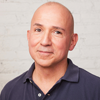
How do you create a sense of community?
Or, do you feel a sense of community?
We asked our social media followers, and they responded
“To create or be a part of community requires a bit of humbleness, to let go of ego and the sense of self-sustainability. Walk into any room with the intention to be vulnerable, gracious and willing to help, and watch how quickly you find where you belong.”
— Jax Kelly
“I decided to create an international support group for people living with (and affected by) HIV many years ago in both English and Spanish. I am a long-term survivor of 34 years; back in the ’80s and ’90s, I wish I would have had a support system and examples like myself and other amazing activists! It was one of the first support groups online in the world and both combined have more than 40,000 active members and growing.”
— Maria HIV Mejia
“I’ve been folded into Honoring Our Experience, a community of long-term survivors, and I could not feel more blessed or supported by them. Led by Gregg Cassin, we meet regularly on Zoom and write our truths. It is a balm for my soul.”
— Martina Clark
“I was diagnosed with AIDS in 1990. I immediately started attending an AIDS support group and volunteering with the local AIDS service organizations and at an AIDS clinic. That is how I found an AIDS community. I was lucky to already have a community of friends in the arts from my theatre work, a supportive church family, a supportive 12-step family and a supportive birth family, all of whom stayed with me and supported me. My work friends abandoned me and voted to end my contract, but my support communities got me through that. When I got well enough to work again in 2002, I made sure my new workplace would be supportive. I’m grateful for all of the support I get.”
— Harry C S Wingfield
“One of the easiest ways to feel part of the community is by getting involved with the different organizations in your area; make sure that you sign up to participate in their activities and assist whenever you can.” It has no power over me.”
— Walking In These Shoes
“My community came into view again. Stigma, hatred, hurt blinded me to my need for community. Feelings of rejection, ostracism and alienation permeated my consciousness. Family members, church members, social friendships didn’t take time to be with me anymore. I was alone. I didn’t know what to do.
“Gradually, I recognized there were actually people all the time saying hello, smiling at me, seeing me, responding to my own smiles and looks. I was not seeing the possibilities all around me to be my community. Not the community others made for me and took away, but the community I recognized that was mine, the one for me. Now my Blackness is beautiful to me and my community of friends, church members, social acquaintances and loving co-volunteers and advocates from around the world are my community.”
— Harold Brown
“My main HIV community is here. I need to reach out more ‘IRL’ but I’m thankful for kind folks here. It was very different in the early ’90s.”
— Dale Friendly
“I’m surrounded by a beautiful community of close friends, church family and coworkers. A dear friend who died of AIDS years ago told me ‘to have good friends we have to be good friends,’ and I believe this to also be true with community. Community doesn’t just happen; we have to put ourselves out there and participate.”
— Rich Sutton
“Bonds of friendship and common interest, made possible by being with people sharing time together.”
— Richard Desmond


